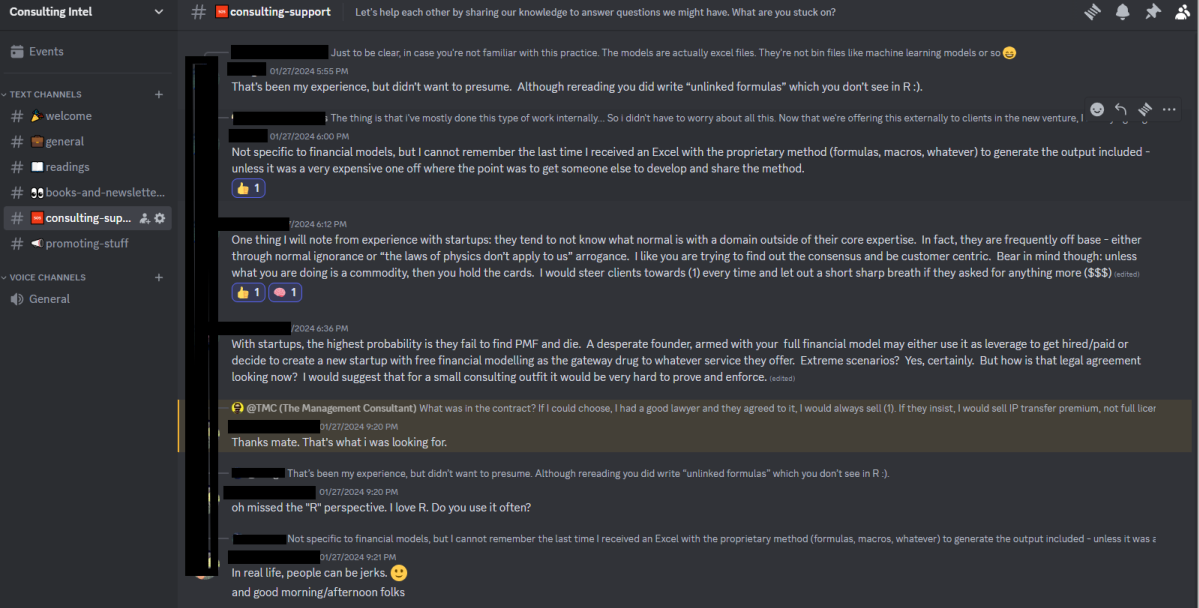How you can become a more valuable consultant by learning from startup CEOs
If competition is for losers, you must find ways to stand out
Hello to the 1,314 subscribers who read Consulting Intel!
Sometime early in my career, when I still had a full head of hair, I was working on a 9-figure project for a big insurance company. I was surrounded by seasoned Subject Matter Experts with experience much more diverse than me, who were all exchanging lively insight and feedback constantly.
As we continued brainstorming and drafting a plan for our engagement for a few days, I could not shake off the feeling that we were taking a tad too conventional approach and might have an opportunity to tackle the project more creatively and differently.
Here’s what I found out:
Most multi-million dollar projects are led by risk-averse executives.
Consequently, consultants often prefer to stick to the proven paths, accountable methods, and passed down “best practices”. Some I have found are even emotional about the tried and tested, as if an industry template is ancient wisdom.
Today, I want to challenge this notion.
What if just doing things the way they’ve always been done is holding us back?
Imagine you are cooking with someone else’s recipe: the food might turn out okay, but will it be something exceptional?
Probably not (even my wife refuses to believe that my changes to her grandmother’s chicken soup recipe improved it).
Think about the internet startups of the mid-2000s.
The internet as a global phenomenon was just starting to build up. Startups were breaking and altering but, for the most part, just making up the rules - as there were none.
What if we, as consultants, start treating our projects as startups?
What if we saw each assignment not just as a problem to fix but as a chance to explore new territory?
A consultant with the spirit of a startup CEO
This idea of becoming a consultant with the spirit of a startup CEO has stuck with me all these years and has been my guiding light as I navigate my career.
Such a mindset includes not just focusing on the numbers and immediate tasks but also figuring out new ways to connect with clients, come up with creative solutions, and lead teams to make the loudest impact.
This does now mean throwing out everything we know.
In the startup world, you PIVOT: if something isn’t going right, you change course quickly. In consulting, we could make great use of such a nimble approach.
For example, let’s say you have been thrown into an unfamiliar client to spearhead the growth of a new domain for the consulting firm you work for. After you understand the scope and scale of what you are dealing with, you should be able to identify a number of opportunities that can be tackled in different ways.
Because there is always an element of probability in chasing opportunities, you can never know in advance which opportunity will convert to business.
You incubate them all until you realize that one, or more than one, can be nurtured into projects.
If you spend time on an opportunity that reveals itself as a dead end, you don’t just give up, shut your laptop, hand off your badge, and call it a day.
No.
You pivot!
You focus your efforts on the next opportunity. You make sure that the solution you offer stands out, you take charge of it, and you keep nurturing it until the fall of success comes.
If a proposal you submitted for your client didn’t really hit the mark, you get feedback, you understand it, and then incorporate it into your next offering.
Competition is for losers
Peter Thiel, co-founder of PayPal and notable early Facebook investor, wrote in his popular book Zero to One that “Competition is for losers”.
If one is trying to be like their peers, they will not stand out. But if one tries to show courage, and mention an independent course of action to bring some of that startup energy into consulting, they can build something novel and original.
For those just starting out in their career, don’t think you are “too junior” to make an immense impact.
Being new means you can try new things and adapt quickly, which is a huge advantage. When you are at the lower rungs of the corporate ladder, you are paradoxically in a unique position to take calculated risks that your leaders can’t afford.
The stakes are different for you. And so are the rules of the game.
In consulting, great ideas can come from anyone.
If you show that your ideas are good for the business, people will start listening to you, no matter how new you are to the job.
As we think about the future of consulting, let’s not be scared to learn from startups.
Let’s be bold, adaptable, and creative.
Let’s not just devise solutions but find new ways to solve problems.
Benchmarks can be helpful, but sometimes we’ll need the courage to say:
“F- best practices”.
✍ The Management Consultant
PS: If you like this newsletter, I have one huge favor to ask.
Please spread the word. Share it with your friends and your colleagues. Ask them to subscribe.
This is the most effective way to support me (…and to keep me motivated to continue writing 😁).
Thank you!
❓ F.A.Q.
Every week, I will choose a question I received from readers and answer it in this section. All anonymous (I won’t mention you unless you ask me to)! Drop your questions here!
Some ideas...
The first thing I'd like to check with you is whether you want to specialize within a specific vertical (an industry), or you would like go horizontally (a capability that can serve multiple industries). This will inform the way we reach out to prospects.
I also would like to check if you are planning to run the consultancy as a "digital" business (eg, worldwide prospects, working mainly remotely, etc), or you are targeting more local clients. Different answers would call for different tactics.
In general, these days it helps if you can establish yourself as an expert on social media. LinkedIn is the obvious choice there, but X is a good option too.
Given that you have significant prior business experience, I would also go through a structured exercise with my contacts.
If each contact can give you 3 leads, you can quickly come up with a good rolodex that you can start converting.
I know that there are firms out there whose job is to provide leads to small agencies, however I have never personally used them so I can't give any opinion about their effectiveness and the quality of the leads they generate.🎯 INTERESTING SH*T
A few things I found on the internet that you may like…
I’m a big fan of Julio Froment’s work and his 📙 Little Almanack. His latest newsletter is 🔥
“Most people won’t”: written in 2015 by Bryce Roberts. Still valid in 2024 (and for decades to come).
I published this on 𝕏 and if you didn’t check it out yet, you should:
🚨 SPONSORSHIP
Consulting Intel is read by more than 1,200 consultants globally.
The readers include management consultants from McKinsey, BCG, Bain, Deloitte, EY, EY-Parthenon, KPMG, PwC, Accenture, Oliver Wyman, PA Consulting, and various boutique consultancies worldwide.
Many corporate employees and independent consultants are regular readers of Consulting Intel.
If you think your products or services could resonate with this audience, get in touch!
PS: Can’t believe I’m saying this, but slots are filling fast! Get in touch.
👀 JOIN THE DISCORD SERVER
If you like this newsletter, you will love our Discord Server.
In there, you will find a tight-knit community of more than 70 management consultants from all over the world discussing real-life challenges, giving each other support and recommending the good stuff to keep our knowledge top notch.










Appreciate that 🙏🏻